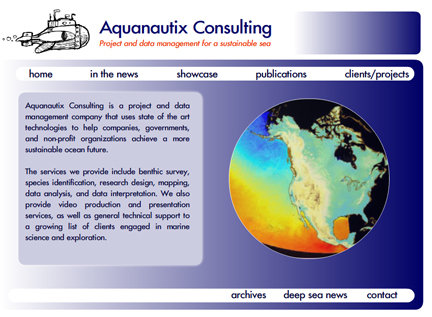
This should be considered an addendum to Craig’s post yesterday, called “So, you want to be a deep-sea biologist“. It assumes you’ve done everything right, and still can’t find a job. Or, maybe you did one little thing wrong and now you’re out on the street. Or, you’re building your career with a Master’s degree, like I was, and you’ve contracted chronic head pain from bumping your head against the “glass ceiling” at your day job. You need something more… stimulating.
So, if there is ever a survival guide published for PhD students trying to raise and feed a family while in school, it should include at least one lesson on how to start a side business as a consultant. Consulting is a short term contractual arrangement to perform services under a “scope of work” outlined by the client. I’ve had my company Aquanautix Consulting for five years now, about one year longer than I’ve been writing for the Deep Sea News.
The advantages to consulting are flexibility, diversity, and broad familiarity with people across the spectrum of the marine sciences. Besides scuba diving for pay, working from home, and itemizing your taxes as a business, two other fun things you get to do with your own consulting company is to a) think of a business name and 2) make a website. What joy. To celebrate Aquanautix Consulting’s 5th Anniversary, I gave Aquanautix.com a make-over. With a favicon! Hooray! It’s updated.
If you’re considering consulting, my advice is to let people know you’re available for short term gigs. Universities, aquariums, museums, and NGOs LOVE short timers. Consultants help to manage the workload while keeping costs down. The day rates are pretty good. I don’t know any consultants making less than $25 hour. Geographic Information Systems (GIS), mapping, research, data entry, and grant writing are good wage earners. Also taxonomy, believe it or not.
The first rule of consulting, of course, is to be professional. These days that means a business card and an online presence. Credit for my website goes entirely to Rodrigo Dorfman of Melloweb Design in Durham, NC. He did the whole thing in Macromedia Flash. He’s fun to work with, not expensive, highly recommended. There’s also some nifty do-it-yourself templates at SiteCube.com. Use your website to showcase your talents.
You don’t have to incorporate, but an LLC (limited liability corporation) will limit your liability if you think someone could try to sue you for being wrong. Imagine you underestimate the rate of shoreline erosion for an eco-friendly seaside resort. That could be bad. At the very least, it may help to have a DBA – or “doing-business-as”. This is an inexpensive first step. With a DBA you can cash checks made out to your company name. To consult for federal government agencies (e.g. National Marine Sanctuaries) or bid on government contracts you’ll need a D-U-N-S number, and a company name of some kind.
Perhaps you’ve thought before about starting a non-profit organization. This is kind of like starting a business, but the operative words there are “non-profit”. And paperwork. I think you file your taxes quarterly or something horrendous like that. Actually, anyone with employees needs to file quarterly taxes. As a consultant, you subcontract people (other consultants). These are never really your employees, so you avoid that paperwork problem for most of the year.
Getting a business off the ground is hard, but keeping it going can be even harder. Try to follow Woody Allen’s advice- 80% of success is showing up. Attend conferences in your area. Make contacts, take people to lunch. It’s a great way to break the ice, and its deductible! So is your new laptop. As your name recognition grows, jobs will come to you because your clients will recommend you. Even if you’re gainfully employed, these side jobs help to pay the bills. If you’re a struggling PhD with kids like me, they pay for the important extras, like trips to the zoo. Plus, consulting is an entree to future opportunities. So if you’ve been thinking about consulting, give it a try. Get out there, and good luck.






I don’t know how are things across the Puddle (some humorously call it Atlantic), but here, if you’re taking a business partner out to coffee, you can put only his bill on business expenses and have to pay for yours for yourself. Really weird, but somewhat understandable.
Good stuff. These are a great series of articles.
One thing I would advise against though is making a Web site that is entirely Flash-based. Unless it is done correctly, the search engine won’t be able to read the text on the site and it will make it less searchable, findable and indexable. That means it will be harder for clients to find the site, which may or may not be a feature.
But if you’re trying to fend off clients so you can finish your dissertation, it works like a charm. ; )
The Aquanautix website is entirely Flash based, but it is still searchable because of metatags, database listings, links, cross referenced material, etc. People still find me, and send resumes. However, most of my business comes from personal contacts, returning clients, references, grant applications, and word-of-mouth, generally in that order.
I should have mentioned in the article above that you don’t necessarily have to be an NGO to apply for grants. Some federal opportunities actually set aside a certain amount for businesses, so this could be considered an advantage in certain cases.